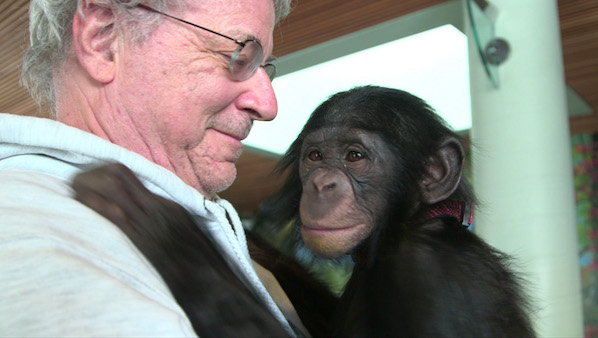Liberty and Justice for All?
Veteran documentarians Chris Hegedus and D.A. Pennebaker, (The War Room, Startup.com) have teamed up again for a timely film about a subject that has been much in the news lately: animal rights, specifically the issue of humans keeping and imprisoning animals—as pets, for experiments, or for other reasons. Unlocking the Cage follows the efforts by attorney Steven Wise, president of the Nonhuman Rights Project, to change the way animals are regarded in the eyes of the law. As he sees it, “The line between humans and nonhuman animals is at an irrational place.” Specifically, Wise is fighting for great apes, elephants and cetaceans (dolphins and whales)—all acknowledged as cognitively complex beings—to be considered “persons” as opposed to “things,” from a legal standpoint. After all, as he persuasively argues, corporations, ships and other inanimate bodies have achieved legal personhood and its accompanying rights; why not a thinking, feeling chimp? Wise describes his mission early in the film as “a hell of a war,” but one whose time has come.
The film shows how Wise and his legal team (Monica Miller, Natalie Prosin and Liddy Stein) bring several lawsuits before various New York State courts, on behalf of captive chimpanzees. Wise, who possesses a gentle, avuncular personality, tells about his epiphany as a young, idealistic lawyer, upon reading Peter Singer’s seminal 1975 book Animal Liberation. Having always wanted to represent the underdog, he found his ideal specialty: animal rights law. He formed the Nonhuman Rights Project and began looking for likely clients, ultimately deciding that caged chimps would be a good start. The idea wasn’t to change federal law overnight or even to win initial lawsuits, but to lay the groundwork for an eventual overhaul of the legal standing of animals.
We watch Wise and his team locate chimps with less than ideal lodgings in various animal farms and “sanctuaries” in New York State. There is confusion and pushback on the part of some owners who love their animals and believe they’re well cared for, but, as Wise explains, the issue is not animal welfare, but animal rights.
The film includes interviews with primatologists who explain how chimps and gorillas understand language and express emotions, as well as their need for socialization and autonomy. We also visit proper sanctuaries in which animals —many retired from circuses and other employment—are not locked in cages, but are housed in outdoor enclosures similar to their native habitat. As his mission progresses, Wise experiences setbacks both legal and otherwise, including the sudden deaths of would-be clients at two different facilities.
Eventually he and his team file suits on behalf of four chimps, including two kept in SUNY Stonybrook’s Primate Locomotion Lab. The lawsuits are extensively covered by the press and Wise appears on The Colbert Report, among other shows, patiently explaining how certain human beings (women, children, slaves) were not considered legal persons at one point. Predictably, there are a lot of Planet of the Apes jokes, and we hear various justices, some more sympathetic than others, struggle with the idea of habeas corpus for animals. It’s clear that our thinking about animals in general has evolved; thirty years ago, Wise’s mission would probably have been ridiculed, and certainly not taken as seriously by the court system.
As he loses decision after decision, the pragmatic Wise is unflappable, and we can’t help but get caught up in his search for a judge “who’s willing to see the plaintiff in a different light.” Eventually he finds one, and even though it’s a partial victory, the seeds for limited animal personhood have been sown.
According to the film, the NonHuman Rights Project is currently working on behalf of circus elephants. Not so coincidentally, Ringling Brothers and Barnum and Bailey Circus have just retired their last performing elephants. Whether or not Wise is around to see an actual change in the law, history is clearly on his side.
Unlocking the Cage opens May 25 at Film Forum.
—Marina Zogbi




